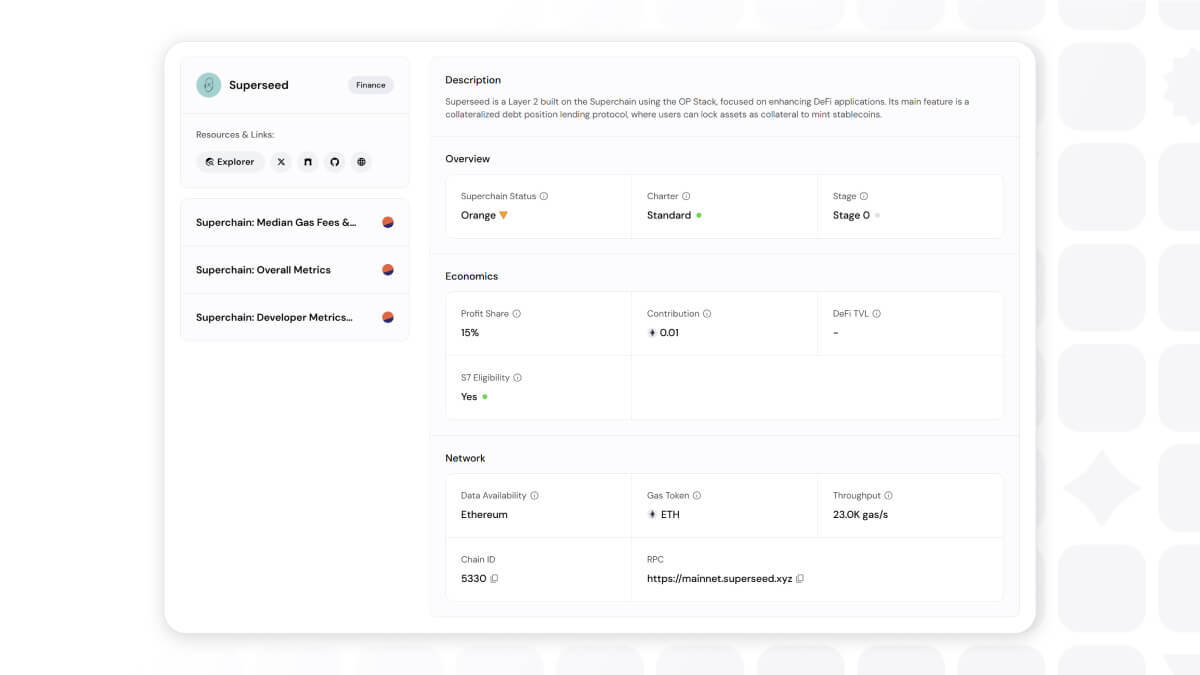Superseed has officially launched its mainnet, joining the Superchain ecosystem as a general-purpose Layer 2 built on the OP Stack. It introduces innovative DeFi features like SuperCDP, Supercollateral, and Proof-of-Repayment to return value to users and make borrowing more efficient.

On March 31st, Superseed launched its mainnet and officially became part of the Superchain Ecosystem. Superseed is a general-purpose Layer 2 with a native CDP lending platform enshrined in the protocol. Running on the OP Stack, Superseed allows builders to seamlessly create with EVM-equivalent tooling and familiar infrastructure.

Superseed is designed to shift value back to the individual. It introduces two new onchain primitives, Proof-of-Repayment and Supercollateral, that tightly align user incentives with network growth. Proof-of-Repayment is Superseed’s native rewards mechanism that distributes a portion of the token supply daily through an auction. Supercollateral is a DeFi primitive that lets users borrow without paying interest, as long as they meet strict safety requirements. Their loans are repaid over time using protocol-generated fees and Proof-of-Repayment rewards.
At the center of this system is SuperCDP, the protocol’s native collateralized debt position platform. It lets users mint the Superseed stablecoin by locking up collateral and is designed to be more efficient than traditional CDPs. With lower borrowing costs, reduced capital lockup, and safety mechanisms that can handle volatility, SuperCDP gives users a powerful tool for accessing liquidity. As the Superseed ecosystem grows, SuperCDP will integrate with other apps on the network, becoming the foundation for new DeFi strategies and services that reward participation and smart capital deployment.
Superseed is designed to financially empower onchain users. Its stablecoin, lending protocol, and reward systems are tightly integrated to create a feedback loop that benefits active participants. Instead of following traditional borrowing models, Superseed returns value directly to users, making it a Layer 2 built for users.
Superseed’s road to mainnet began with a clear goal: build a Layer 2 chain that shifts value back to the individual. By building on the OP Stack, the team gained access to shared infrastructure, strong security guarantees, and a vibrant developer ecosystem.
A key milestone was the Supersale, an open and permissionless token sale designed to empower onchain individuals. The Supersale gave users early access to the native token $SUPR and a chance to participate in its growth from the start. With zero vesting, a community-first distribution model, and fair pricing, it broke away from the venture capital model in token launches. It was a clear statement of Superseed’s mission: to financially empower those who live onchain and ensure they have real ownership in the networks they help build.
Built on Ethereum’s vision of financial freedom, Superseed launches with a full suite of DeFi apps ready from day one. Users can immediately trade, borrow, lend, and earn across the entire stack with the following apps:
These projects are just the first live on day one.More are on the way and all of them share the same goal: making financial freedom easier to access and more reliable to use.
With Superseed now live, the Superchain continues to gain momentum. Over 50% of all Layer 2 activity is already happening on the Superchain, with networks like OP Mainnet, Soneium, and World Chain leading the charge. Superseed aims to fill a key niche in the Superchain ecosystem, delivering next-gen DeFi to everyone.
As more chains and apps launch, the Superchain is quickly becoming the go-to place for serious builders and real-world users. Want to stay in the loop of all Superchain developments? Explore Superchain.Eco and subscribe to Superchain Sunday, our weekly newsletter, to stay up to date on all things Superchain.





